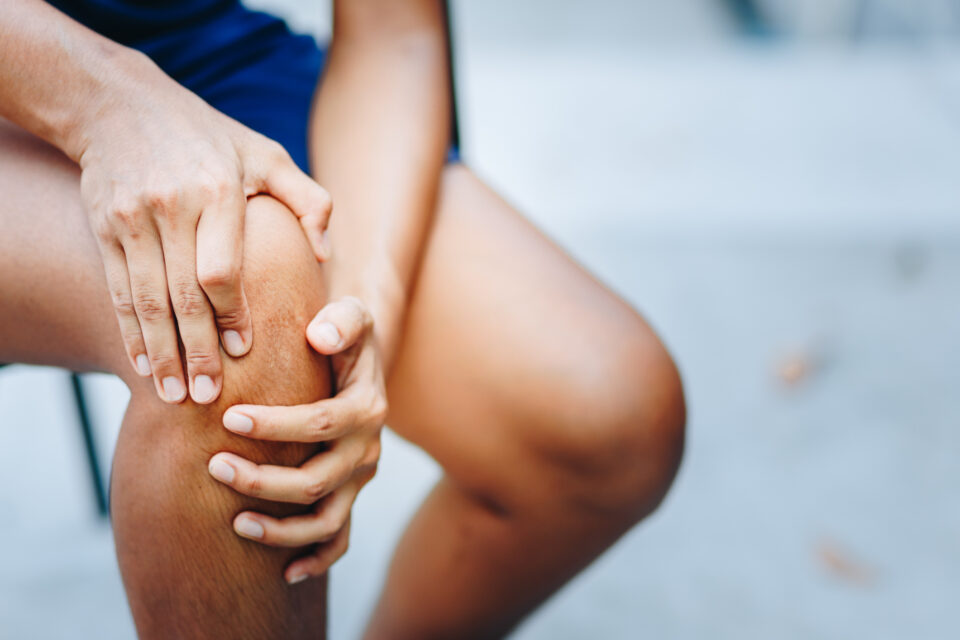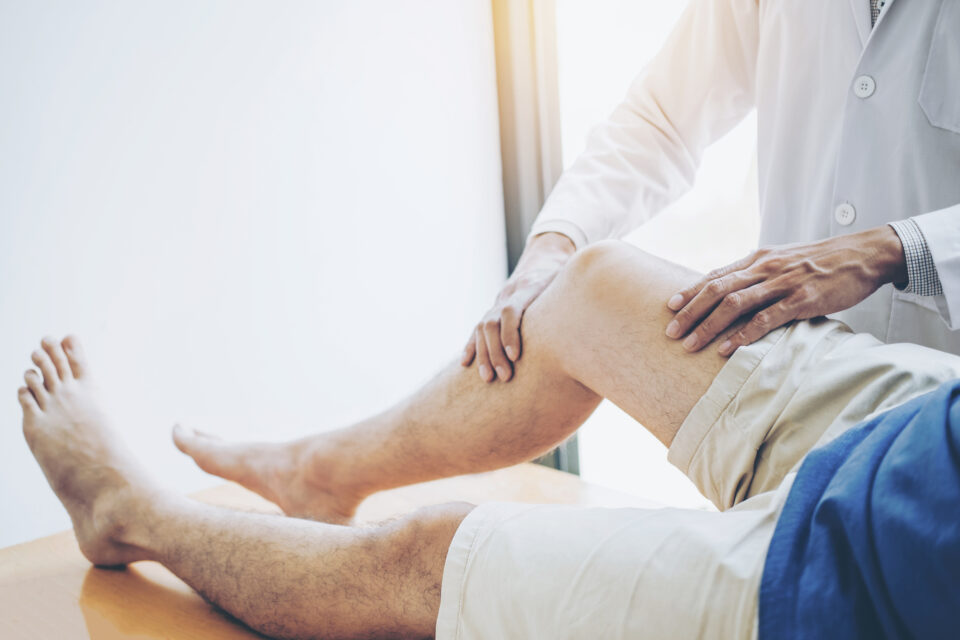Knee Pain FAQ
Frequently Asked Questions About Knee Pain Causes & Treatment
If you’re suffering from knee pain, Pain & Spine Physicians can help. Our trained pain specialists provide effective knee pain relief for Texas patients looking to improve their quality of life. Whether you live in the DFW Metroplex or San Antonio, we can provide world-class knee pain treatment for your acute or chronic pain. Below, please find answers to questions we frequently receive from new patients. When you’re ready to explore our tailored treatment plans, don’t hesitate to contact us for an appointment.
What Are the Most Common Causes of Knee Pain?
While the causes of knee pain can vary, many of our patients experience pain from overuse, injury, or simply not stretching enough before physical activities. Warming up and cooling down are essential parts of a workout to avoid muscle strains and sprains. Arthritis, osteoarthritis, bursitis, and patellar tendinitis are painful conditions that can affect your knees over time. Most knee pain is caused by arthritis or osteoarthritis, which is wear and tear on your body’s joints that occurs as you age.
Tendinitis is characterized by pain beginning in the front of the knee that tends to worsen when going up or down an incline or stairs. If you kneel for long periods, you could develop the inflammation known as bursitis. Knee pain causes could also include a torn ligament or cartilage, which are common sports injuries. A person with a knee injury will usually know when and how it happened. However, arthritis-caused knee pain may be more gradual, with dull aches and pains that come and go.
What Kind of Injuries Can Cause Knee Pain?
Knee pain causes include injuries that twist or distort the knee. Injuries causing knee pain often include a torn ligament (ACL tear) or torn cartilage (a meniscus tear). These types of injuries are common among athletes and may be caused by a direct blow to the knee or non-contact twisting of the knee. Bone fractures affecting the patella (kneecap) are also possible causes of knee pain. Fractures are usually the result of a slip-and-fall or car accident. People with osteoporosis are more susceptible to knee fractures. Your knee could also slip out of place and become dislocated, causing excruciating pain.
What Are the Symptoms of a Knee Injury?
When it happens, most people will recognize a knee injury, such as an ACL tear. Knee injury symptoms may vary by injury, severity, and individual. These are the most common symptoms of a knee injury that may require urgent medical care:
- Immediate knee pain or swelling
- Pain with knee movement or activity
- A popping or snapping sensation in the knee
- Feeling like the knee is going to “give out” when standing or walking
- Redness and warmth to the touch
- Walking with a limp

How Can I Prevent Knee Pain?
Exercising regularly and remembering to warm up and cool down while stretching can help you stay in better physical shape and avoid knee pain. Always wear the proper footwear when exercising and replace your footwear often. Ask about orthotic footwear to improve your body mechanics and prevent injury, especially if you’re a runner. Improving your gait with orthotic footwear can take the stress off your knee joints as you walk or run.
Will My Knee Pain Go Away on Its Own?
It depends on the cause of your knee pain. If it’s related to overuse, it might go away with self-care. You should rest, avoiding putting weight on your knee if at all possible. Keep your knee elevated, apply ice, and take over-the-counter pain relievers to help reduce the swelling. Arthritis pain may come and go, while injuries may require urgent medical care. If you have difficulty walking, crutches may be needed. Knee braces and physical therapy may also be recommended to help relieve your knee pain.
When Do I Need to See a Doctor for Knee Pain?
You probably need urgent medical care if you’re in severe pain or can no longer bear weight on your knee. If your pain doesn’t improve with self-care or you have other symptoms, such as a fever, redness, warmth, numbness, or tingling, contact your doctor.
What Knee Pain Treatments Are Available?
You may take over-the-counter pain relievers and rely on hot and cold treatments at home to help alleviate your knee pain. However, these remedies may only provide temporary knee pain relief. Pain & Spine Physicians has board-certified doctors who are also renowned pain management specialists to provide more effective knee pain relief. Our personalized knee pain treatment plans may include knee injection therapy to help get you back on your feet as quickly as possible.
What Can I Expect During Knee Injection Therapy?
At Pain & Spine Physicians, we strive to provide natural knee pain treatments that don’t involve invasive surgery whenever possible. Depending on your issue, we may suggest knee injection therapy. It’s not as bad as it sounds. Joint injections are among the safest, gentlest, and most effective pain treatments available. Medicine (corticosteroids) is inserted directly into your knee joint to reduce pain and inflammation and help strengthen the muscles in and around your knee. Many find lasting knee pain relief from therapeutic joint injections, but they may not be suitable for everyone. Talk to your doctor.
How Do I Keep My Knees Healthy?
Maintaining a healthy weight and getting regular exercise can help keep your knees healthy. Know your physical limits. When you get tired, stop. Pushing yourself too hard when exercising or participating in a sport can overexert your muscles, leading to injury. Exercising also helps you keep your muscles strong and flexible, so they can help stabilize your joints and improve your range of motion. If you’ve sustained a knee injury in the past, it could happen again if you don’t take steps to prevent it.

How Can I Exercise for Knee Pain?
The best exercises for chronic knee pain include swimming, water aerobics, and other low-impact physical activities. Stretching is essential to keep your muscles strong and flexible. Ask about balance and stability training to help prevent injury and build up the muscles that help support your knees. Other exercises for knee pain that you may want to try include straight leg raises, leg presses, wall squats, calf raises, hamstring curls, step-ups, and side leg raises.
Why Choose Pain & Spine Physicians for Knee Pain Treatment?
Pain & Spine Physicians is dedicated to helping people with acute or chronic knee pain. Our staff is trained in medicine, anesthesiology, surgery, rehabilitation, and psychiatry to approach each patient’s pain from a holistic perspective. We tailor knee pain treatment plans according to each person’s needs because we know everyone experiences and reacts to pain differently. You can rest assured we will explore all available modern treatments to avoid invasive surgery or prescribed opioids. We’ll examine the cause of your knee pain to address it head-on and develop the best treatment plan. Our goal is to restore your mobility and quality of life through our specialized pain management.
Schedule an Appointment With Our Pain Management Specialists
If you’re experiencing knee pain, you probably want answers about what caused it and how to alleviate it. With locations in Dallas, Frisco, McKinney, Flower Mound, Southlake, and Sherman, Pain & Spine Physicians is devoted to providing knee pain relief for Texas residents. Whether your knee pain is chronic or acute, you can rely on our world-class medical care to help you explore your options for the best knee pain treatment. Contact us to schedule an appointment at a location near you today!
